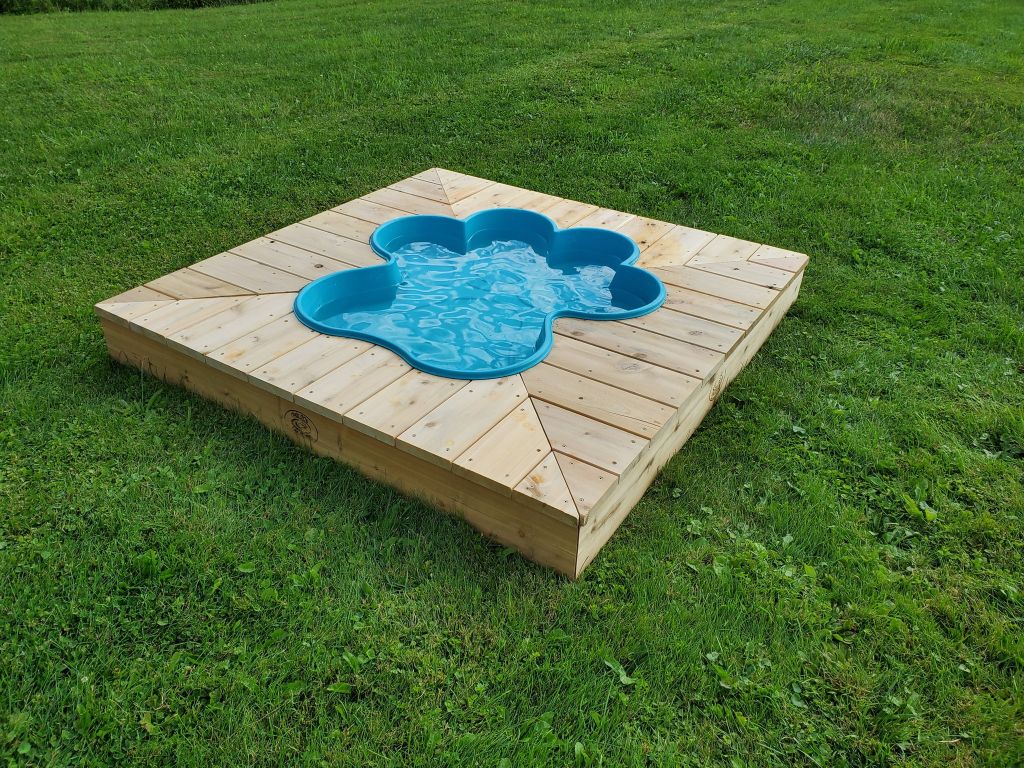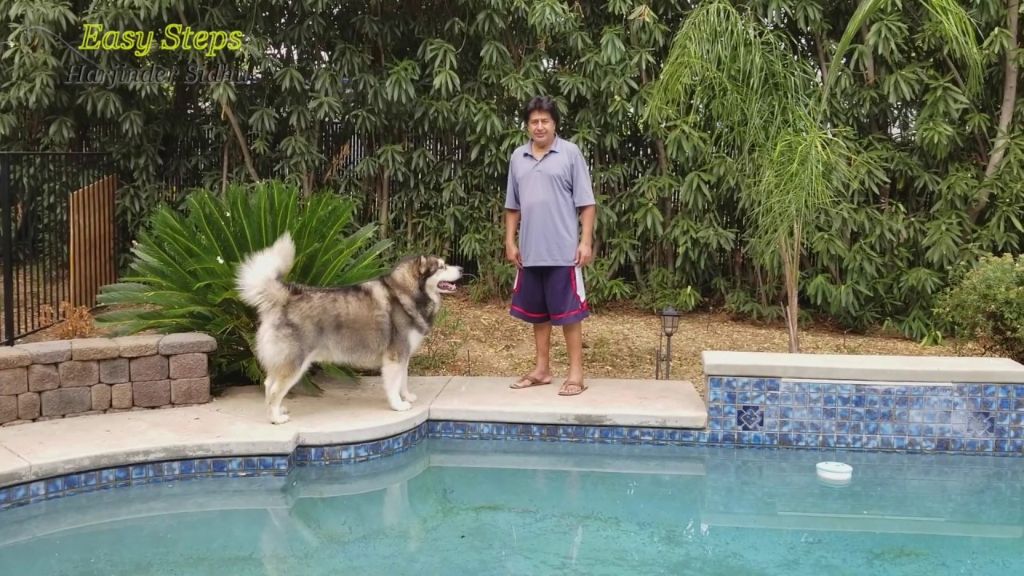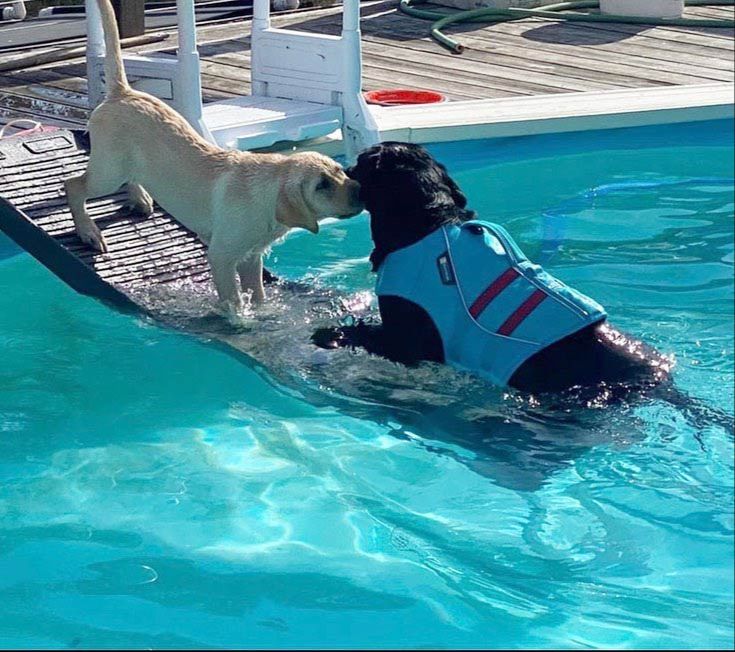Introduction
The purpose of this article is to discuss whether or not dogs can damage swimming pools and provide pet owners with the information they need to make informed decisions. We’ll examine how factors like dog nails, paw pads, fur shedding, chemicals, rough play, and waste can impact both the dog’s health and the condition of the pool.
Dog owners want to include their pets in family activities, but may be unsure if allowing dogs in the pool is safe or hygienic. This article aims to outline the potential risks and benefits to help owners decide what’s best for their pet and pool maintenance.
Pool Materials
There are three main types of materials used for in-ground swimming pools: concrete, vinyl, and fiberglass [1].
Concrete pools, sometimes called gunite pools, are made by spraying concrete over steel rebar frames. Concrete is durable, customisable, and good for large or uniquely shaped pools, but is more expensive. It requires more maintenance as the concrete surface can deteriorate over time [2].
Vinyl liner pools have a steel or polymer wall structure lined with vinyl. Vinyl liners are affordable and come in various designs, but can tear and require replacement every 5-10 years. The walls provide less structural stability than concrete [3].
Fiberglass pools are made from molded fiberglass shells installed into an excavation. They are durable, low maintenance, and have a smooth surface, but offer less customization. The cost is higher than vinyl but lower than concrete [2].
Dog Nails
Dogs’ nails can become quite sharp, especially if they are not trimmed regularly. Sharp nails can cause scratches and damage to pool surfaces. According to a Reddit discussion, regular nail trimming and walking on cement can help blunt dog nails [1]. Another source recommends regular nail trimming, using a nail grinder, and filing down sharp edges to keep nails smooth [2]. Sharp nail points in particular should be trimmed off to prevent scratches.
Dog Paw Pads

Dog’s paw pads are made of fat and connective tissue, which makes them soft and pliable [1]. Their paw pads are designed to be durable and provide traction, allowing dogs to run and play without damaging their feet. While dog paws can become dry or cracked, especially in extreme weather, their soft pads are unlikely to cause any damage to swimming pools.
Healthy dog paw pads have thick fatty padding that cushions their feet and protects from abrasions. Hyperkeratosis, excessive production of keratin that makes paw pads dry and cracked, is uncommon and preventable with proper paw care [2]. Overall, a dog’s soft paw pads do not pose a risk of scratching or damaging pool surfaces.
Pool Chemicals
Chlorine is the most common chemical used to sanitize pool water and keep it free of harmful contaminants. However, the amount of chlorine in a pool designed for humans may be too harsh for dogs (https://www.akc.org/expert-advice/health/can-dogs-swim-in-chlorine-pools/). High chlorine levels can irritate a dog’s skin, eyes, and mucous membranes. Ingesting too much chlorine through drinking can also make a dog sick.
The ideal chlorine level for a dog pool is 1-3 ppm (parts per million). This is lower than the recommended level for human pools which is typically 3-5 ppm. Anything above 5 ppm may start to irritate a dog’s skin and eyes (https://www.baracuda.com.au/pool-tips/dogs-in-pools-how-they-affect-your-pool-water).
In addition to chlorine levels, the pH of the pool water also needs to be properly balanced for dogs, generally between 7.2-7.8. Water that is too acidic or basic can further irritate a dog’s skin and eyes.
Dog Fur
Dog fur can be a nuisance in swimming pools. As dogs swim and play in the water, they tend to shed loose hair that ends up floating on the surface of the pool (Cleaning Tips for Dog Hair in the Pool, https://www.ahs.com/home-matters/quick-tips/how-to-remove-dog-hair-from-pool/). This is especially true in the summer when dogs shed their winter coats. The shed fur floats around in clumps, making the pool look unclean and unsightly.
Shedding is a natural process for dogs as their hair growth cycle causes old hair to be replaced by new hair. However, certain breeds of dogs tend to shed more than others. Heavy shedders include German Shepherds, Labrador Retrievers, Golden Retrievers, and Siberian Huskies (How To Keep Dog Hair From Ruining Your Swimming Pool, https://gettlepools.com/2017/08/18/keep-dog-hair-ruining-swimming-pool/). Keeping their fur well-brushed can help reduce shedding.
Floating dog fur in a pool is not just an aesthetic issue – it can also clog up pool filters and prevent proper water circulation. Therefore, regular skimming and vacuuming is necessary to remove dog fur from the pool.
Rough Play
Dogs love to play in pools by jumping, splashing, and running around. This type of rough play can potentially damage pools in a few ways (source):

- Their nails can scratch the pool lining, tiles or coping as they scramble in and out of the pool.
- Jumping into the pool can dislodge or crack tiles if done repeatedly in the same spot.
- Running around the edge can wear down the pool coping over time.
- Big splashes can wash away powdery pool chemicals like chlorine before they dissolve.
- Excessive splashing can result in water loss and potentially damage pool equipment if it runs dry.
While regular play shouldn’t pose serious issues, owners should discourage dogs from roughhousing too vigorously, scratching surfaces, or leaping into the pool near steps, ladders or fittings. Providing alternative areas for pets to play can help divert some of their rough energy.
Dog Waste
Dog urine and feces can be problematic for swimming pools. According to the EPA, pet waste can contain harmful bacteria and pathogens that can contaminate water [1]. When dogs urinate or defecate in a pool, it releases nitrogen, phosphorus, and ammonia into the water [2]. This causes an unhealthy chemical imbalance and allows dangerous contaminants to flourish.

Feces contains high levels of bacteria like E. coli, Giardia, and Salmonella [3]. These can be transferred to humans and cause severe gastrointestinal illness. Urine can alter the pH balance of pool water, burning the eyes and skin of swimmers. The chlorine normally used to sanitize pools can only do so much to neutralize dog waste.
Any traces of urine or feces in a pool should be immediately removed. The pool may require shock treatment with extra chlorine to remove contamination. It’s best to restrict dogs from using pools as bathrooms and create designated relief areas. With vigilance, dog waste can be kept from harming pool water quality and swimmer health.
Prevention
There are several steps pool owners can take to prevent damage from dogs, while still allowing dogs to enjoy swimming. Setting clear pool rules for dogs is important – dogs should be supervised at all times and not allowed to jump or scratch the liner. Providing a dog ramp or steps allows easier entry/exit and reduces chances of scratching (Baracuda).

Training dogs to use the stairs and teaching them commands like “off” can prevent unwanted behaviors. Installing fencing around the pool will also limit access for dogs when unattended (Aer CM). Chemicals and dog waste should be rapidly diluted and cleaned out. Regularly trimming nails blunt can reduce scratches. Finally, providing toys and supervision maintains safety and reduces chances for damage.
Conclusions
In summary, while dogs can potentially cause some damage to swimming pools, there are steps pool owners can take to minimize these risks. The main concerns are dog nails scratching the pool surface, chemicals in the water irritating the dog’s skin and eyes, dog fur clogging filters, and dog waste contaminating the water. However, regular grooming and nail trimming can help reduce scratching and shedding issues. Rinsing dogs off before they swim will remove dirt and chemicals from their fur and paws. Monitoring pool chemistry is important for any pool, regardless of dog use. And being diligent about quickly cleaning up any accidents will help keep the water sanitary. With some commonsense precautions, pool owners can enjoy swimming with their dogs without excessive damage or hassle.